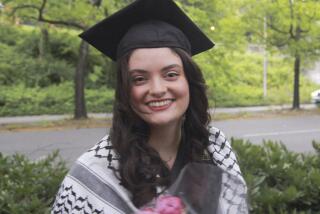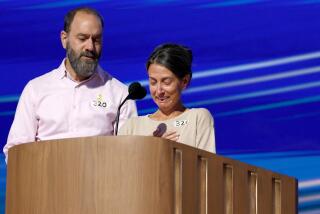Joan Baez Walks and Sings a Delicate Line in Israel
- Share via
JERUSALEM — An Israeli newspaper recently published a cartoon showing Ronald Reagan, with garland and guitar, flashing a ‘V’ sign and running toward Israeli Prime Minister Yitzhak Shamir. The caption quoted a shocked Shamir as saying, “Oh please! I still haven’t recovered from Joan Baez!”
The prime minister had no contact with the American folk singer and political activist during her recent weeklong visit to Israel and the Occupied Territories. Yet he undoubtedly saw the numerous press accounts of her meetings with Israeli peace activists, her well-attended concerts and her visits to Palestinian refugee camps in the West Bank and Gaza Strip.
The Palestinian uprising, which has been raging for nearly six months, has provoked varying responses among non-Israeli artists. The Switzerland-based Bejart Ballet company issued a harshly worded public declaration before going forward with its scheduled performances at the 1988 Israel Festival, commemorating 40 years of Israeli statehood.
Bejart’s declaration, which appeared as a paid advertisement in the Israeli press, called the killing of children--Israeli or Palestinian--a “monstrosity” and stated that “the Palestinian people were right to revolt against the Israeli occupation.”
American saxophonist Steve Lacy chose to boycott the festival entirely. When he called to cancel his quartet’s performance last week, he told festival officials that he was protesting Israel’s handling of the uprising.
Joan Baez, by contrast, came to Israel specifically because of the uprising. Her visit was added to the beginning of a previously planned European concert tour.
Though long a critic of the Israeli occupation, the 47-year-old folksinger was careful to admit the limits of her ability to comprehend the current struggle. “I must have the humility to admit that I will never understand what it would be like to be a Palestinian Arab living in occupied territory,” Baez told several hundred Palestinians who had gathered in her honor at the National Palace Hotel in Arab East Jerusalem.
“And on the other hand,” she said, “I will never understand what it is to be Jewish (and) feel 2,000 years of homelessness, fear, persecution and desperation.”
Throughout her travels, the 47-year-old folk singer urged both Israelis and Palestinians to pursue alternatives to what she termed the “dialogue of death” gripping these two warring peoples. Speaking to the gathering at the National Palace Hotel, she emphasized her longstanding commitment to nonviolent civil disobedience.
“Nonviolence is nothing more than organized love,” Baez said. She quoted the advice Mahatma Gandhi gave to his fellow Indians, in their revolt against the British.
“As Gandhi said, ‘In order for this to be a real revolution, we must free ourselves from being at the receiving end of the guns and free the British from being at the other end of the guns.’ ”
Baez’s words were received in awkward silence. Just before she had mounted the stage, Palestinian singer and songwriter Mustafa Kurd had performed several of his own compositions, in Arabic.
“We are sending stones against the tanks,” he boasted in one song, while in another he declared, “We are the children of the land, and in our hands are stones.”
A banner behind the stage further highlighted the contrast between the singer’s pacifist vision and the David-versus-Goliath imagery that has come to dominate the Palestinian uprising. “Palestinian Self-Determination Is the Path to Peace” declared the banner’s bold letters. Illustrating the slogan was a figure hurling a large stone. One Palestinian whom Baez had hoped to meet was Mubarak Awad, founder of the Palestinian Center for the Study of Non-Violence. By the time of her arrival, however, Awad had been detained pending deportation proceedings before Israel’s Supreme Court.
Awad is regarded by Israeli officials as an instigator of the Palestinian uprising. In recent months, he has openly advocated such protest measures as the non-payment of Israeli taxes, a boycott of Israeli commercial products and refusing to carry the identity cards assigned to all Arab residents of the Occupied Territories. Baez also carried her message of nonviolence to the other side of this land’s vast ethnic and political divide--to the several thousand Israelis who attended her two public concerts.
Her first concert was held in a restored Roman amphitheater at Caesarea, along the Mediterranean coast. Teen-agers in sandals and cutoff jeans shared the amphitheater’s tiered stone benches with older Israelis whose fondness for Baez’s music dated from her years as a folk singer in the 1960s. Some simply came to hear a woman whom they regard as a legendary singer. “I hope that the concert will focus on music and not politics,” said one 24-year-old Israeli.
Others were enthusiastic in supporting Baez’s longstanding commitment to political activism. “It gives us the sense that we’re not alone in feeling that justice and human rights are part of the values of this society,” said a 65-year-old resident of a nearby kibbutz.
Baez included in her concert repertoire a hard-hitting song by Israeli rock singer Si Hi-Man. The song, “Shooting and Crying,” unsparingly condemns what it sees as a brutal response to the Palestinian uprising.
“Shooting and Crying” has been widely criticized within Israel and was recently banned by one of the country’s most popular rock radio stations, the military-run Galei Tzahal. Despite this opposition to the song, Baez was enthusiastically applauded by both her Caesarea and Tel Aviv audiences.
Baez’s Israeli promoter, Chaim Slutsky, was unmoved by the public’s enthusiasm. Before the first concert, he had told her that, as a non-Israeli, she had no business singing the song.
Galei Tzahal radio shared Slutsky’s dismay. When the station manager learned that Baez had sung “Shooting and Crying” in Caesarea, he revised the station’s plan to broadcast her Tel Aviv performance live. Instead, the concert--minus the disputed song--was aired after a two-hour delay.
Baez donated all profits from the Tel Aviv concert to Peace Now. This group’s rallies demanding an Israeli withdrawal from the Occupied Territories have drawn up to 30,000 supporters in recent months.
More controversial was the singer’s appearance, on the final evening of her visit, at a rally sponsored by Yesh Gvul, a group of some 500 Israeli soldiers who have signed a declaration refusing to take part in “suppressing the uprising and insurgency in the Occupied Territories.” Since December, when the Palestinian uprising began, 21 soldiers affiliated with this group have been imprisoned. Yesh Gvul’s brand of protest politics rang true to Baez, whose own advocacy of draft resistance in the Vietnam War era caused her to be jailed on two occasions.
Standing before the hundreds of Yesh Gvul supporters who filled the seats and lined the aisles of Tel Aviv’s Tzavta Theater, she smiled broadly. The crowd had just joined her in singing a spirited version of the American civil rights classic, “Oh Freedom.” Both the positive spirit and the practical limits of Baez’s nonviolent activism were grasped by Yesh Gvul leader Peretz Kidron. His own refusal to serve as a reserve soldier in the territories dates back to 1974.
“I don’t think her message of nonviolence was very well understood,” Kidron said shortly after Baez departed for Germany. “The normal reaction of Israelis is that it might work in India or Louisiana, but it won’t work here.”
One of the Israelis who attended Baez’s Tel Aviv concert expressed a similar view. “She is against any violence,” said 37-year-old Avshalom Vilan, a leading Peace Now activist. “You have to understand that, in Israel, we have to fight for peace and to defend our country.”
More to Read
The biggest entertainment stories
Get our big stories about Hollywood, film, television, music, arts, culture and more right in your inbox as soon as they publish.
You may occasionally receive promotional content from the Los Angeles Times.










